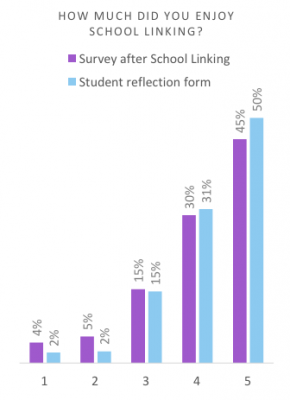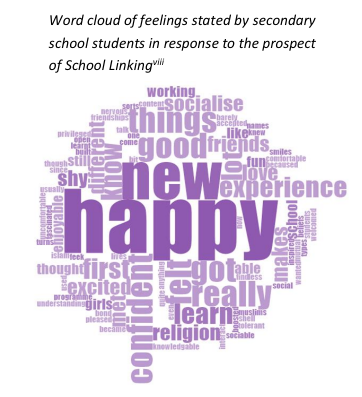
Statement on Hate Crime in UK – 19th February 2024
19 / 02 / 24
Menu

06 / 01 / 21
We are delighted to announce the publication of this extensive report ‘Contact in the Classroom’ into one of our most well-loved projects, the interfaith ‘School Linking’ Programme. This report is the culmination of a 3-and-a-half-year process between F&BF and Dr Lucy Peacock and is rooted in her doctoral research conducted at the Centre for Trust, Peace and Social Relations at Coventry University.
 The objective of the research was to provide an original account of how the Faith & Belief’s Forum’s School Linking Programme fosters ‘peaceful relations’ in schools. Dr Peacock’s PhD combined interdisciplinary research in education, the sociology of religion and social psychology with impact evaluation to provide an original account of the role and effectiveness of School Linking.
The objective of the research was to provide an original account of how the Faith & Belief’s Forum’s School Linking Programme fosters ‘peaceful relations’ in schools. Dr Peacock’s PhD combined interdisciplinary research in education, the sociology of religion and social psychology with impact evaluation to provide an original account of the role and effectiveness of School Linking.
Our Schools Programme Manager Sarah Koster described the decision to embark on this report:
“F&BF recognised that it is only through making ourselves and School Linking vulnerable that we can be receptive to learning. Strengthening the programme through research enables us to meet the changing needs of our teachers and students and so the opportunity for an extensive research-based evaluation was too good to miss.”
A valuable resource in faith methodology, the research speaks to four strands of social and academic debate, and can further learning amongst academics, teachers and practitioners:
The research draws upon analysis of almost 1,500 student and teacher surveys designed by F&BF in 2016-17, as well as data collected by Dr Peacock in 2017-18 through online surveys, teacher focus groups and participant observation of teacher training and school activities. Whilst the qualitative findings are not representative of all School Linking students, they provide a more detailed picture of the processes underlying how relationships are formed between young people taking part in School Linking.
 This report summarises Lucy’s research findings and their implications for our understanding of School Linking’s theoretical underpinnings of Contact Theory. It closes by detailing how the research has influenced the design, delivery and evaluation of the School Linking Programme moving forward.
This report summarises Lucy’s research findings and their implications for our understanding of School Linking’s theoretical underpinnings of Contact Theory. It closes by detailing how the research has influenced the design, delivery and evaluation of the School Linking Programme moving forward.
Sarah Koster surmised that within this report “you will read findings that are not only crucial for F&BF, but anyone involved in contact-based programmes” especially in relation to the implications of power dynamics throughout the entire process.
We invite you to read Dr Peacock’s findings, and share with us your thoughts on the report!